Policy and Basic Concept
As a global healthcare company, the Eisai Group has established the ENW (Eisai Network Companies) Environmental Policy and conducts business activities with an emphasis on global environmental protection. The policy states: “3. Contribute to the mitigation of climate change by reducing greenhouse gas emissions and promoting energy conservation” and as such, we are promoting initiatives to realize a carbon-free society on a global scale.
In November 2023, The Eisai Group set a Science Based Targets (SBT)aligned with the 1.5℃ goal for reducing greenhouse gas emission based on scientific evidence, and received approval from the SBT initiative in November 2023. In December 2023, we were approved to join the JCI Race to Zero Circle by the Japan Climate Initiative (JCI), committing to achieving Net-zero emissions by 2050. Eisai is also a member of the RE100 initiative and aims to transition all electricity used in our business operations to renewable energy by FY2030.
In pursuit of these medium- to long-term goals, we are strengthening collaboration not only within the Eisai Group but also with our business partners.
Targets, Issues and Actions
| Targets | Issues | Actions | Results(FY2024) |
|---|---|---|---|
|
Climate change mitigation
|
|
|
|
*1 Limited to electricity purchased directly from energy companies
*2 Greenhouse gas emissions increased as a result of a review of the data subject to calculation and changes to the calculation methodology
SBT (Science Based Targets: targets for reducing greenhouse gas (GHG) emissions based on scientific grounds)
The Eisai Group has set medium- to long-term greenhouse gas emission reduction targets shown below (SBT1.5℃ target*3) based on scientific grounds to help mitigate climate change and is working to reduce CO2 emissions derived from its business activities.
- Reduce Scope 1 and Scope 2 GHG emissions by 55% by FY2030 (compared to FY2019)
- Reduce Scope 3, Category 1 GHG emissions by 27.5% by FY2030 (compared to FY2019)
Activities to achieve Net-Zero by 2050
In FY2024, we continued to promote global initiatives aimed at reducing greenhouse gas emissions. Our multifaceted efforts including ongoing energy conservation, transitioning to electrification, expanding the use of renewable energy, and working toward 100% adoption of hybrid and electric vehicles for sales fleets in Japan. We also steadily promoted environmental investments through our Internal Carbon Pricing (ICP), and actively engaged with suppliers to encourage sustainable practices. Furthermore, in response to international disclosure standards and stakeholder expectations, we initiated the development of a “Transition Plan for Climate Change Mitigation.” This plan incorporates scenario analysis, assessment of climate-related risks and opportunities, strategies and roadmaps for reducing greenhouse gas emissions (Scopes 1, 2, and 3), alignment with financial and investment planning, and the establishment of governance structures. Through these comprehensive and actionable efforts, we are strategically driving progress toward achieving our 2050 Net-zero emission target.
A roadmap for achieving net-zero
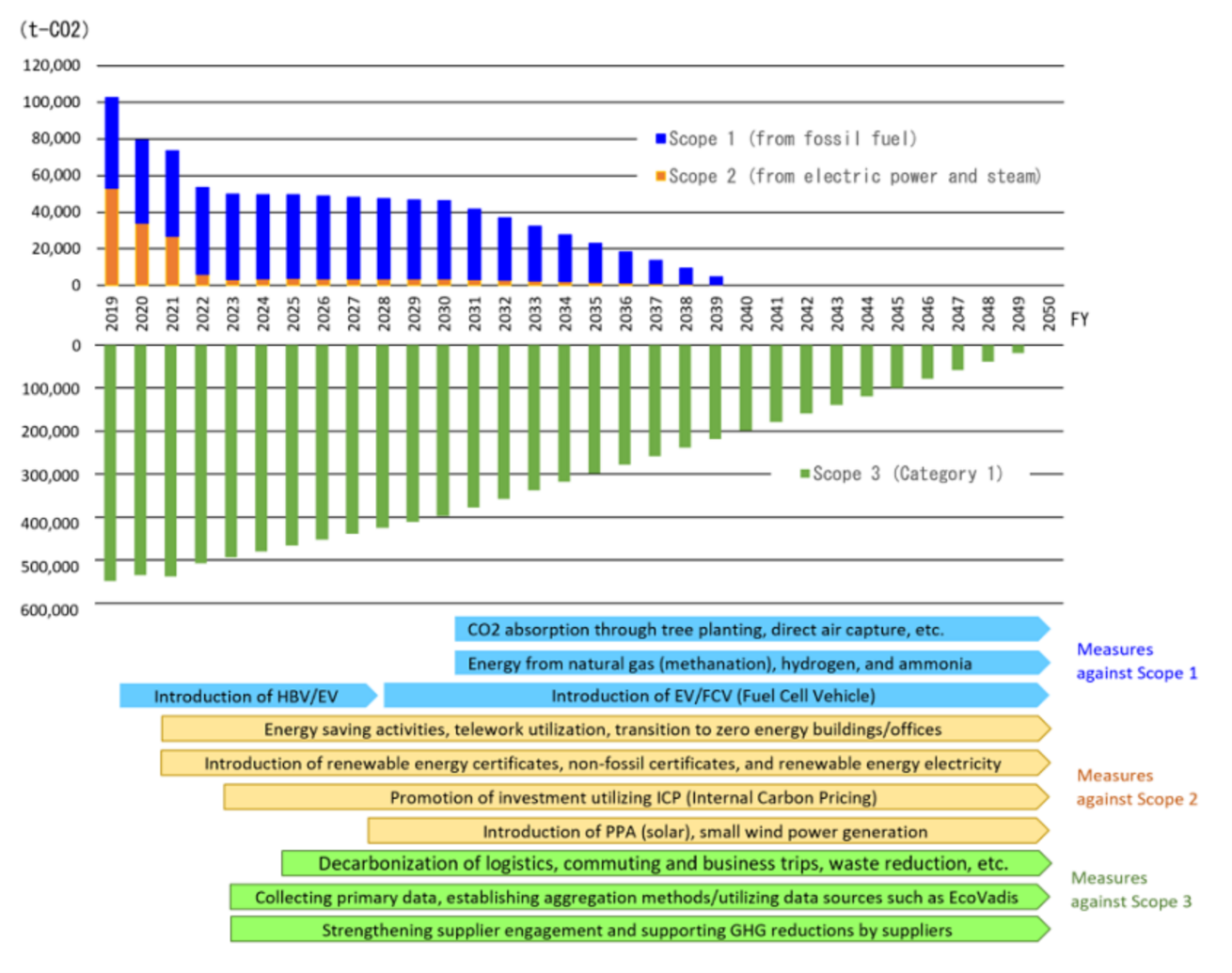
Structures and Systems
The Eisai Group has established an global environmental management framework to drive sustainability initiatives across all regions. In addition to promoting global activities, we are enhancing efforts to identify and assess environmental risks both in Japan and internationally, and to develop effective countermeasures.
Promotion Structure and Environmental Audit
https://www.eisai.co.jp/sustainability/environment/management/structure/index.html
Initiatives
As part of our concrete environmental initiative, at the Kawashima Plant (Gifu Prefecture in Japan), we implemented eco-mode operation for air conditioning systems and optimized the efficiency of heat pump operations for heating water used in air conditioning. The site also utilizes a cafeteria management building certified as a ZEB*4. At our overseas sites, the Suzhou Plant (China) discontinued the use of boilers in February and introduced steam supplied via municipal pipeline. As a results, the plant reduced CO₂ emissions by approximately 60 tons compared to the previous fiscal year.
In March 2024, the Plant officially began operating full-scale operation of an energy management system to optimize the power consumption by collecting and analyzing energy consumption data associated with the operation of the equipment. At the European Knowledge Center (The United Kingdom), biogas was introduced across the site, including office areas, leading to a reduction of approximately 560 tons of CO₂ emissions in FY2024 compared to the previous year. Additionally, at the Vizag site (India), the fuel source for boilers was switched from light oil to natural gas, resulting in a reduction of approximately 760 tons of CO₂ emissions in FY2024 compared to the previous year. We continue to promote the use of renewable energy at our factories and research laboratories both in Japan and overseas.
In the Sales Division of Eisai Co., Ltd., we are advancing remote engagement with healthcare professionals using digital tools and encouraging the use of public transportation for sales activities. By the end of FY2024, we successfully completed the full transition of our sales fleet to hybrid and electric vehicles.
Furthermore, in fiscal 2022, we introduced an Internal Carbon Pricing (ICP) system to promote effective investment in CO2 emission reductions. This system visualizes the monetary value of CO₂ reductions and incorporates it into investment decision-making as an environmental value. The Eisai Group set its ICP at 11,000 yen (80 euros at the time of introduction) per ton of CO2, referencing European carbon tax and emissions trading price. This pricing is applied when evaluating capital investment proposals.
*4 Abbreviation for Net-zero Energy Building. A building that aims to achieve a comfortable indoor environment while reducing the annual primary energy consumption of the building to zero.
Data
SBT (Science Based Targets: targets for reducing greenhouse gas (GHG) emissions based on scientific grounds)
In fiscal 2019, Eisai has committed to the Science Based Target (SBT) initiative, initially adopting the 2.0℃ target, which aimed to reduce GHG emissions by 30% by fiscal 2030 compared to fiscal 2016 levels. We successfully met our interim targets for three consecutive years through fiscal 2022, achieving a GHG emissions reduction of over 60% from the 2016 baseline. In recognition of this progress, we have set a more ambitious goal aligned with the SBT 1.5°C target, which was officially approved by the SBT initiative in November 2023. We are now accelerating our efforts company-wide to achieve this new target.
In fiscal 2024, our Scope 1 and 2 emissions totaled 49,587 tons, representing 96.7% of the previous year’s missions. This result also corresponds to 99.8% of the planned emissions level outlined in our roadmap achieving the 1.5℃ target, indicating that we are on track to meet our goal.
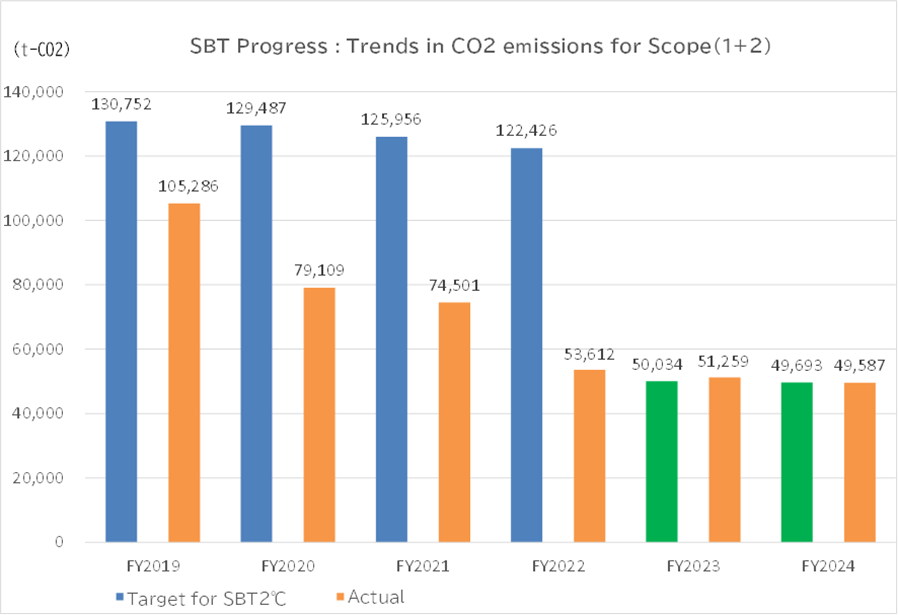
Note: The actual Scope 1 and 2 emissions for FY2019 are different from the Scope 1 and 2 emissions for the base year (FY2019) of the SBT 1.5℃ target, which is 102,512 tons, due to adjustments to the boundary after FY2023, etc.


Efforts Concerning Company Vehicles
In fiscal 2024, CO2 emissions from company vehicles totaled 12,464 tons, representing a 7.6% increase compared to the previous fiscal year. In Japan, Eisai Co., Ltd. and EA Pharma Co., Ltd. achieved a 100% hybrid and electric-powered vehicle adoption rate for gasoline-fueled company cars, effectively minimizing the increase in emissions.
In contrast, the Americas region saw a 15.6% increase in emissions due to intensified sales activities, driven by the continued expansion in the use of our key oncology and neurology products. Similarly, in Asia and Latin America, strengthened sales efforts led to an 18.9% increase in emissions. Meanwhile, in the EMEA region, emissions were reduced by 12.0% through the strategic replacement of diesel vehicles with hybrid models. We will continue to systematically promote the transition to hybrid vehicles globally, aiming to further reduce CO2 emissions from company vehicles.
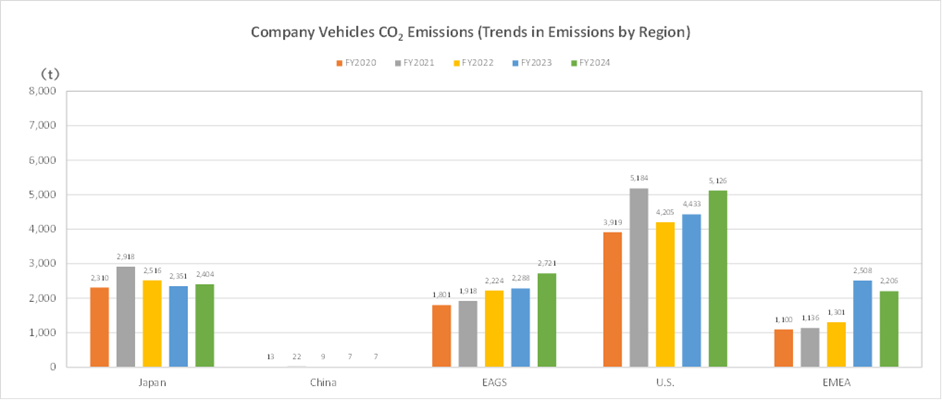
Eisai Co., Ltd. has been progressively transitioning its sales fleet to HV (hybrid vehicles), and in FY2024 the adoption rate increased to an annual average of 96.1%. The introduction of electric vehicles has also begun, and combined with HV, 100% of our sales fleet now consists of environmentally friendly vehicles.
On the other hand, CO2 emissions from company vehicles were 1,736 tons, a increase of 10.0% compared to the previous year, partly due to intensified sales activities for new products In addition to the use of low-emission vehicles, we continue to leverage remote meetings with healthcare professionals using digital tools to further reduce CO₂ emissions from vehicle use.
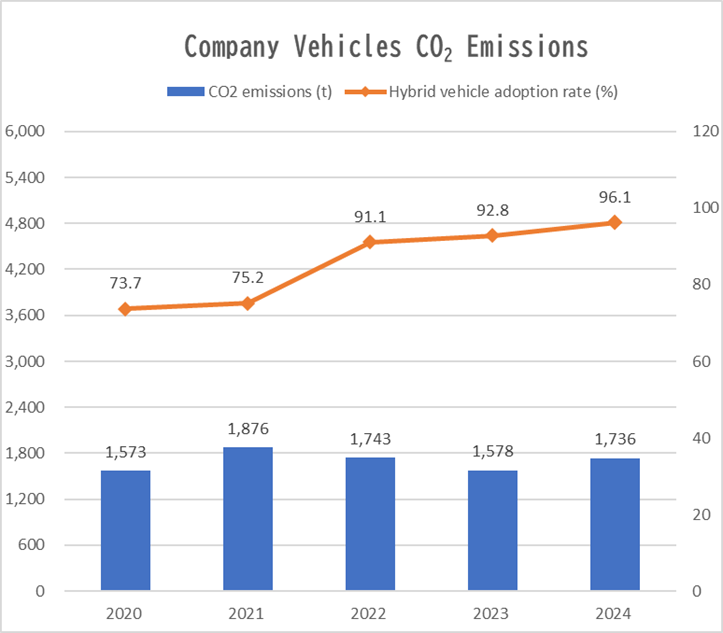
Efforts to reduce Scope 3 emissions
For Scope 3, Category 1 emissions based on purchased goods and services, the aggregation method was changed to be more precise from fiscal 2022, when the SBT 1.5℃ was set. Additionally, for fiscal 2024, the data used for calculation was revised and the calculation method was modified to further refine our calculation approach. Consequently, the emissions for fiscal 2024 increased by 80.9% compared to fiscal 2019 and by 46.4% compared to the previous fiscal year. The category 1 emissions accounted for 91% of our total Scope 3 emissions, which amounted to 911,173 tons. Going forward, we will promote the reduction of Scope 3 emissions by strengthening our cooperation with suppliers and establishing a calculation method that better reflects the actual situation, for example by reflecting primary data on CO2 emission reductions by suppliers in the aggregation.

Note: The actual Scope 3 emissions for FY2019 are different from the Scope 3 emissions for the base year (FY2019) of the SBT 1.5°C target, which is 548,122 tons, due to adjustments to the boundary after FY2023, etc.
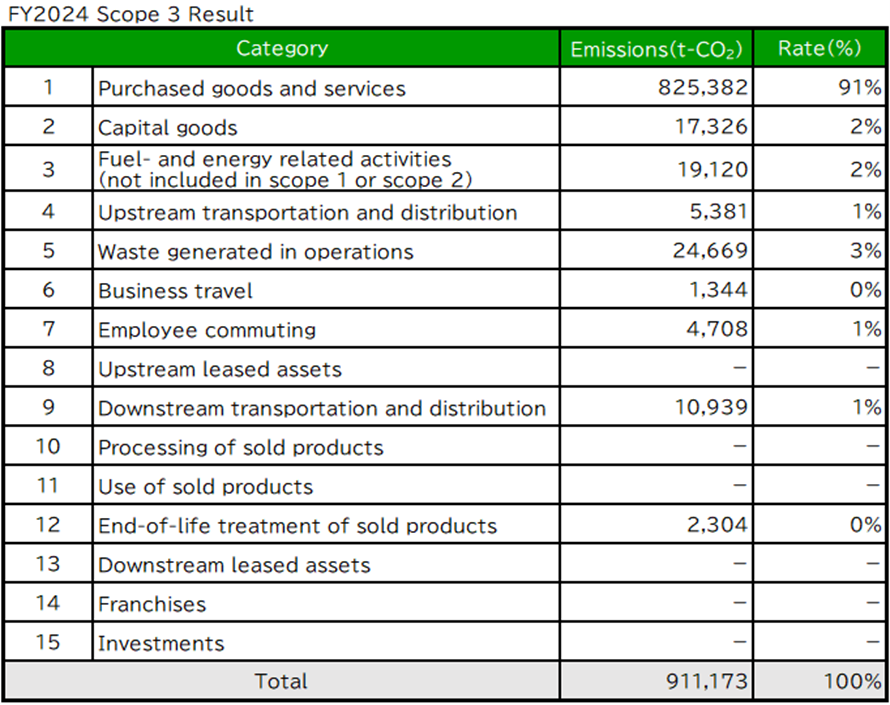
Progress in introducing renewable energy
The Eisai Group is actively promoting the adoption of renewable energy across its global operations. In fiscal 2024, we advanced initiatives at multiple sites, , including full-scale operation of a large on-site solar power generation facility at the Vizag Site (India), the use of electricity procured through Power Purchase Agreements (PPAs), and the acquisition of non-fossil certificates in Japan and renewable energy certificates overseas.
As a result of these efforts, the renewable energy adoption rate for externally purchased electricity used in our business activities reached a high level of 98.7%.*4
*4 Including electricity generated by co-generation systems using non-fossil fuels, the overall renewable energy adoption rate is 98.2%.
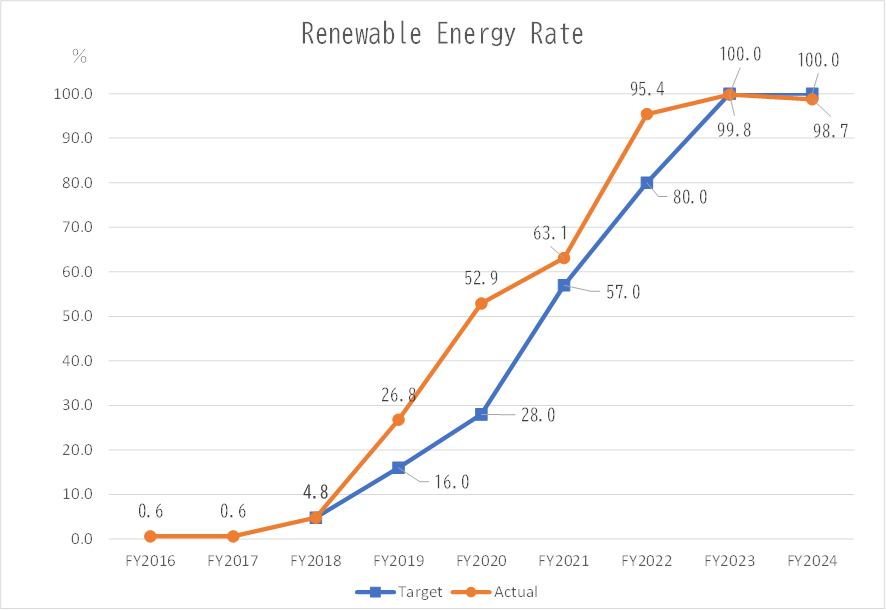
CDP Climate Change Report 2024
CDP is an international non-profit organization that evaluates and discloses corporate efforts to address environmental risks—including climate change, water security, and deforestation—based on requests from institutional investors worldwide.. Since 2015, the Eisai Group has responded to the CDP Climate Change questionnaire. In the CDP Corporate Questionnaire 2025, we received the highest rating of “A” (leadership level) climate change and water security, on an eight-level scale ranging from A, A− to D and D−.
In addition, our proactive efforts to promote environmentally conscious business practices across the supply chain, including engagement with suppliers, were highly recognized. As a result, Eisai was selected as a ‘Supplier Engagement Leader’.


